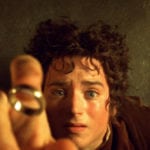 History
History  History
History  History
History 10 “Modern” Problems with Surprising Historical Analogs
 Health
Health 10 Everyday Activities That Secretly Alter Consciousness
 History
History Top 10 Historical Disasters Caused by Someone Calling in Sick
 Animals
Animals 10 New Shark Secrets That Recently Dropped
 Movies and TV
Movies and TV 10 Forgotten Realities of Early Live Television Broadcasts
 Technology
Technology 10 Stopgap Technologies That Became Industry Standards
 Weird Stuff
Weird Stuff 10 Wild Facts About Taxidermy That You Probably Didn’t Know
 Travel
Travel 10 Beautiful Travel Destinations (That Will Kill You)
 Miscellaneous
Miscellaneous 10 Modern Marriage Rituals Born from Corporate Branding
 History
History 10 Extreme Laws That Tried to Engineer Society
 History
History 10 “Modern” Problems with Surprising Historical Analogs
 Health
Health 10 Everyday Activities That Secretly Alter Consciousness
Who's Behind Listverse?

Jamie Frater
Head Editor
Jamie founded Listverse due to an insatiable desire to share fascinating, obscure, and bizarre facts. He has been a guest speaker on numerous national radio and television stations and is a five time published author.
More About Us History
History Top 10 Historical Disasters Caused by Someone Calling in Sick
 Animals
Animals 10 New Shark Secrets That Recently Dropped
 Movies and TV
Movies and TV 10 Forgotten Realities of Early Live Television Broadcasts
 Technology
Technology 10 Stopgap Technologies That Became Industry Standards
 Weird Stuff
Weird Stuff 10 Wild Facts About Taxidermy That You Probably Didn’t Know
 Travel
Travel 10 Beautiful Travel Destinations (That Will Kill You)
 Miscellaneous
Miscellaneous 10 Modern Marriage Rituals Born from Corporate Branding
10 Controversial Songs That Left Their Mark On Pop Culture
Every generation has a song or two that caused a “bit of a ripple” upon its release. Way back when, in the 1950s, many felt that Elvis and his swinging hips was the work of the devil. By the time the 1980s was upon us, many genuinely believed the devil really was coming out of the speakers of the young through their heavy metal music. Some songs leave such an imprint at the time, they are forever associated with that controversy and are ingrained not just in music history but into popular culture as a whole.
10Get Back
The Beatles
Although the lyrics of The Beatles’ hit “Get Back” are said by some to be about getting back to your inner child and inner peace, others believe that the tune is a covert attack on immigration in the United Kingdom. While there is little, if any, foundation for the claims, particularly as The Beatles embraced many different cultures and overall diversity, it still pops up every now and then in conspiracy discussions—usually right alongside the one where the “real” Paul McCartney died in 1966 but the band covered it up.
There were alternative versions of the song recorded, which did indeed offer more direct references to immigration to the United Kingdom. However, these satirical lyrics were written very much as a condemnation of racist and xenophobic attitudes.
9Better By You, Better Than Me
Judas Priest
When two young men (James Vance and Ray Belknap) attempted suicide in 1985—one of them succeeding—the parents of the surviving boy (Vance) claimed the song “Better By You, Better Than Me” was to blame, and the band had intentionally placed subliminal messages within the song to encourage such action.
The trial lasted several days before being dismissed from court. Judas Priest frontman Rob Halford stated to the press following the case being thrown out that had the band placed any messages in their songs, it would be to buy more of their records as opposed to suicide.
Incidentally, Vance did succeed in committing suicide in 1988, when he intentionally overdosed on painkillers.
8Rape Me
Nirvana
Songwriter Kurt Cobain claimed the song “Rape Me,” from the final Nirvana studio album In Utero, was an anti-rape song. Many women’s groups and rape survivor groups descended upon the band, arguing to the contrary.
Given that Cobain often wrote words that had little meaning, the song was likely exactly that—just a song. If looking for any meaning at all, it could be argued (when read alongside other words from the In Utero album) that the lyrics most likely refer to the music industry and Cobain’s increasing distain for it. Whether incidentally, or because of the attention the song brought, the band did play numerous charity shows for victims of rape, both in the US and in war-torn Bosnia.
7Bring Your Daughter . . . To The Slaughter
Iron Maiden
As unlikely a Christmas number one as it was, the veteran rockers stormed the UK charts with the tentatively titled “Bring Your Daughter To The Slaughter” in late December 1990, entering at the top spot for Christmas weekend and staying to see in the New Year.
Written as part of the soundtrack for the latest Nightmare On Elm Street film, the song drew the attention of groups who claimed it glorified violence toward women. The band completely denied this, stating the song was simply something “off-the-cuff” to fit in with the movie theme.
Although it wasn’t banned, the original video to the song was scrapped after concerns it was too graphic given the complaints. A collection of live shots was hastily thrown together instead.
6Suicide Solution
Ozzy Osbourne
Ozzy Osbourne is no stranger to controversy at the best of times. But when he found himself in a US court charged with encouraging the suicide of his fans through the use of backward messages in his songs, even the most conspiracy-minded of people had to shake their heads a little.
The song in question, “Suicide Solution,” is about the dangers of alcohol and the slow way it will kill you if you allow yourself to be used by it. However, according to the parents of John McCollum, Ozzy had inserted instructions in his music for his fans to commit suicide. Their son had shot himself after backward satanic messages he had heard in the song told him to “Get the gun! Shoot!”
The case was ultimately thrown out of the courts due to a complete lack of evidence. However, Osbourne faced increased picketing from religious groups across America at his shows for years after.
5God Save The Queen
The Sex Pistols
The only time in UK history where there was (officially) no song at the number one position was the week the punk band The Sex Pistols had their song “God Save The Queen” reach the top spot.
Such was the disgust of the majority of “decent” people in British society, the BBC refused to play or even acknowledge the song. As you might imagine, going by the logic that if someone says you can’t have it you only want it more, many young punk fans rushed out to buy copies, as well as packing out their shows up and down the country.
The song itself is an attack on the monarchy, which the writer of the lyrics, John Lydon, refers to as a “fascist regime” who have “made you a moron!”
4One In A Million
Guns N Roses
In the space of just over four minutes, using words such as “niggas” and “faggots,” Axl Rose, vocalist and writer for “One In A Million,” managed to offend the gay community, immigrants, the police, and the black community—not to mention many anti-racist and anti-discrimination groups. The overall feeling of the otherwise largely forgotten song was one of suspicion, derogatory tones, and aggression to those different to him.
In his defense, Rose stated it was simply his personnel observations and reflections on his experiences when he first moved to Los Angeles, while also offering that “his” guitarist (Slash—Saul Hudson) was of mixed race (his mother was black), so he couldn’t be, and indeed wasn’t, racist. Slash, although he has rarely been critical of Rose personally over the lyrics, has consistently stated he “doesn’t care” for the song.
While Rose is to the best of the known world’s knowledge certainly not racist, it was not his most well thought out moment, something he himself has admitted since.
3F—CK The Police
NWA
Just from the title of NWA’s 1989 track “
They did, and they were (although in reality it appears the group got a strong talking to as opposed to being charged).
As is usually the case when authorities get involved in popular culture, interest in the group skyrocketed. They quickly became one of the most talked about acts in the United States and by the mid-’90s had spawned the even more successful solo careers of founding members Ice Cube and Dr. Dre.
2Cop Killer
Bodycount (Ice T)
When Ice-T reflected on the song “Cop Killer” and the controversy it caused, he stated in the documentary The Hip-Hop Years that one minute he was “playing Nintendo,” the next he was looking at the vice president (Quayle) quoting his words on live television. The moment was surreal.
There was particular focus on the line, “Die pig! Die pig die!” with the audience being asked to consider what that line would sound like if it were about “Jews” or “homosexuals!”
The song itself was a response—albeit a harsh one—to the recent beating of motorist Rodney King and the subsequent acquittal of the four police officers accused of the crime. Those who sought to ban it argued that it was promoting and condoning violence against police officers.
1Me So Horny
2 Live Crew
Partly because it highlighted an open secret of prejudice still seemingly present at the time in the United States, “Me So Horny” by Florida hip-hop band 2 Live Crew is arguably one of the most controversial songs of recent times.
While it was “just offensive” when young black males were stating just how horny they were, when huge portions of young white Americans took an interest—particularly white females—the anger over the song was taken up a notch or two. At least, that was the defense of many who fought against its censorship.
For their part, the group have repeatedly stated that the controversy over the song, including them being arrested for performing it live, led to a huge increase in album sales and attendance at their shows. In short, it did them a huge favor, which some might argue is a kind of poetic justice.
Marcus Lowth is a writer at Me Time For The Mind. Visit it on Facebook.








